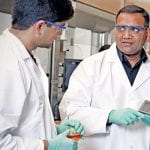Ramani named vice provost for graduate education
Ramani will serve as a key member of the provost’s core leadership team, advising the provost on graduate education trends, programming and policy and acting as a collaborative partner with the schools. Read the full article here.
Chris named Electrochemical Society and Toyota Young Investigator Fellow
Former doctoral student, Chris Arges (current associate professor at Penn State), has been awarded various honors. Among them includes the prestigious NSF CAREER Award. Read the full article here. Congratulations!
Shri appointed to a faculty position at UT San Antonio
 Dr. Shrihari “Shri” Sankarasubramanian was appointed as a tenure-track Assistant Professor in the Department of Biomedical Engineering and Chemical Engineering at the University of Texas at San Antonio. Shri’s background and details of his appointment can be found here.
Dr. Shrihari “Shri” Sankarasubramanian was appointed as a tenure-track Assistant Professor in the Department of Biomedical Engineering and Chemical Engineering at the University of Texas at San Antonio. Shri’s background and details of his appointment can be found here.
New catalyst helps combine fuel cell, battery into one device
 Regenerative fuel cells, with high round-trip efficiencies like that produced with a catalyst developed in the lab of Vijay Ramani, are well suited for submersibles, drones, and spacecraft, as well as for off-grid energy storage. Read the full article here.
Regenerative fuel cells, with high round-trip efficiencies like that produced with a catalyst developed in the lab of Vijay Ramani, are well suited for submersibles, drones, and spacecraft, as well as for off-grid energy storage. Read the full article here.
A more efficient way to find a more efficient battery
 A ‘universal descriptor’ will help determine the best chemicals to use, reducing time in the lab — and costs — necessary for the development of new batteries, new research in Vijay Ramani’s lab shows. Read the full article here.
A ‘universal descriptor’ will help determine the best chemicals to use, reducing time in the lab — and costs — necessary for the development of new batteries, new research in Vijay Ramani’s lab shows. Read the full article here.
Ramani lab awarded grant to update power plants
New catalyst resolves hydrogen fuel cell cost, longevity issues
New tech can get oxygen, fuel from Mars’ salty water

Electrolysis system that doesn’t need pure water may change the game when it comes to exploration. Read the full article here.
Novel system can extract oxygen, fuel from salty water on Mars
 The team, led by Vijay Ramani, a professor at the Washington University in the US, examined the new system in a simulated Martian atmosphere at minus 36 degrees Celsius. Read the full article here.
The team, led by Vijay Ramani, a professor at the Washington University in the US, examined the new system in a simulated Martian atmosphere at minus 36 degrees Celsius. Read the full article here.
Ramani wins $2 million to further develop flow batteries

Vijay Ramani and his lab will further develop and de-risk its electrode-decoupled redox flow battery technology and position the team for scale-up and deployment. Read the full article here.
Engineers develop new fuel cells with twice the operating voltage as hydrogen fuel cells

Doubling the voltage would allow for a smaller, lighter, more efficient fuel cell design, which provides advantages for commercial use. Read the full article here.
No more trial-and-error when choosing an electrolyte for metal-air batteries
 Engineering researchers demonstrate how electrolytes for alkali-metal air batteries can be selected using a single, easy-to-measure parameter. Read the full article here.
Engineering researchers demonstrate how electrolytes for alkali-metal air batteries can be selected using a single, easy-to-measure parameter. Read the full article here.
High-powered fuel cell boosts electric-powered submersibles, drones
 A team of engineers in the McKelvey School of Engineering has developed a high-power fuel cell that operates at double the voltage of today’s commercial fuel cells. It could power underwater vehicles, drones and electric aircraft. Read the full article here.
A team of engineers in the McKelvey School of Engineering has developed a high-power fuel cell that operates at double the voltage of today’s commercial fuel cells. It could power underwater vehicles, drones and electric aircraft. Read the full article here.
Record-breaking half a million committed to 10 research teams through LEAP

Ten Washington University in St. Louis research teams have been selected to receive funding in the Fall 2018 cycle of the Leadership and Entrepreneurial Acceleration Program. Read the full article here.
Ramani installed as Wittcoff Distinguished University Professor
 Vijay Ramani has been named the inaugural Roma B. and Raymond H. Wittcoff Distinguished University Professor of Environment and Energy at Washington University in St. Louis. He was installed Sept. 13 in a ceremony at the Charles F. Knight Executive Education & Conference Center. Read the full article here.
Vijay Ramani has been named the inaugural Roma B. and Raymond H. Wittcoff Distinguished University Professor of Environment and Energy at Washington University in St. Louis. He was installed Sept. 13 in a ceremony at the Charles F. Knight Executive Education & Conference Center. Read the full article here.
Is the future of energy stuck in the past?
 “Future energy breakthroughs will be driven in part by technology, and in part by policies that force change. Unlike fossil fuels, they may not be cheap – but someday, they might be just as abundant.” Read the full article here.
“Future energy breakthroughs will be driven in part by technology, and in part by policies that force change. Unlike fossil fuels, they may not be cheap – but someday, they might be just as abundant.” Read the full article here.


